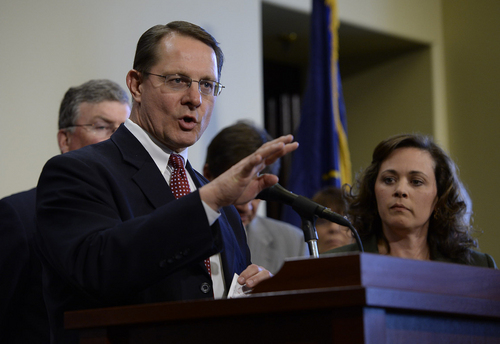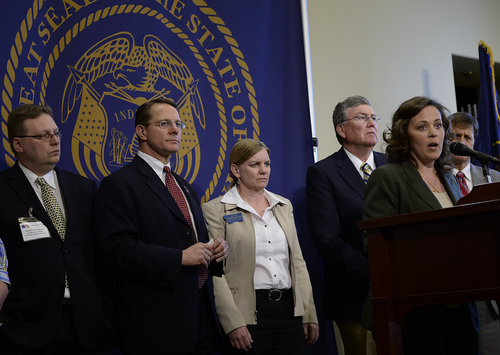This is an archived article that was published on sltrib.com in 2014, and information in the article may be outdated. It is provided only for personal research purposes and may not be reprinted.
A pair of related questions for which there is no good answer:
Do the elected officials in some Western states who continue to claim that a state takeover of millions of acres of federally owned land is both wise and possible believe what they are saying?
Or are they deliberately tantalizing voters with a promise they know will never be fulfilled, gaining political mileage by pretending to stand up to Big, Bad Washington in a futile — and, for those politicians, risk-free — gesture of defiance?
Either way, the powers that be in Utah, and their friends from eight other Western states, who broke bread together Friday over the idea of breaking the federal control of so much of their states, don't look good.
Yes, the people elected to lead in Utah and the other U.S. states west of the Continental Divide do find themselves in a situation that is different from their counterparts to the East. When our states were carved out of vast — and, in many cases, unpopulated — swaths of federal land, the sensibilities of those federal officials were changing.
Instead of being eager to sell all land into private ownership and development, as happened as the United States moved west of the Ohio, and then the Mississippi, rivers, federal leaders were becoming more concerned about keeping title to much of that property. Maybe they were becoming conservationists. Maybe they thought that all that rocky, dry territory wasn't going to draw much interest anyway.
The result is that our region contains so much federally owned land that state and local officials are expected to muddle through with vastly reduced property tax bases, and with economies where federal authorities have much more say over such things as mining, drilling and grazing.
The chances of that ever changing are slim and none. It would require that the elected representatives of the whole United States, who manage all federal lands in the interest of all of the American people, agree to give those lands to states whose clearly stated goal is to allow more exploitation and development of territory that the feds have been proudly protecting for a century or more.
Given the decreasing ability of those drought-stricken lands to support more grazing, and the rapidly approaching days of a post-petroleum economy, Congress would be doing the West no great favor by enabling our politicians' dream of exploiting those lands in such short-sighted and destructive ways.
Pretending that it will ever happen is a deliberate attempt by our local politicians to mislead us. We shouldn't let them.





